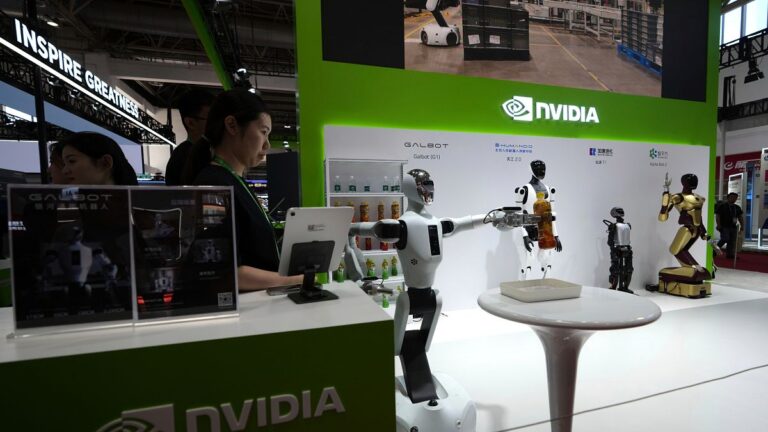Published on

ADVERTISEMENT
Nvidia and AMD have agreed to pay 15% of their revenues from sales of artificial-intelligence chips in China to the US government.
The unprecedented deal, first reported by the Financial Times on Sunday, is part of a bargain to secure export licenses for the Chinese market.
Nvidia will share revenue from sales of its H20 chip, while the pledge applies to AMD’s MI308 chips.
According to FT sources, the Trump administration has not yet decided how to use the money.
“The unusual arrangement is another example of a mega tech company acquiescing to the US administration’s demands, to gain an upper hand as trade relations are redrawn,” said Susannah Streeter, head of money and markets at Hargreaves Lansdown.
“Nvidia’s Q1 revenue took a $2.5 billion (€2.1bn) hit due to restrictions on H20 sales to China, but it clearly believes the 15% contribution is well worth it, to keep access to the vast and fast developing market,” she added.
The US government last week began to grant licenses for Nvidia to sell its H20 chip in China.
The move represented a U-turn for the White House, which in April banned sales of the chip to China, linked to concerns that the technology could be used for military purposes.
The H20 chip was specifically designed for the Chinese market, in line with restrictions introduced by former president Joe Biden in 2023.
Huang had harshly criticised April’s export ban, arguing that restrictions were causing more harm to American businesses than to China. Critics argued that as well as denting the profits of US firms, restricting access to the Chinese market provided an added incentive for China’s domestic industry to innovate.
The new pledges from AMD and Nvidia are unusual, as no US company has ever agreed to pay a portion of their revenues to obtain export licences.
Even so, this brand of dealmaking is becoming increasingly characteristic of firms dealing with the Trump administration. The president is notably encouraging companies to invest in the US to obtain more favourable tariff rates.
Last week, Apple said it would invest another $100bn (€85.8bn) in the country, adding to a previous pledge to spend $500bn (€429bn) in the US over the next four years.
The announcement came as President Trump said he would impose a 100% tariff on computer chips, only sparing companies that commit to “building” on US soil.
The easing of chip export restrictions has also arrived as relations between Washington and Beijing have thawed in recent weeks.
Earlier this year, the Trump administration threatened a 145% duty on Chinese goods sent to the US, and Beijing responded with a 125% retaliatory tariff. The two sides decided to lower these taxes in May, and then agreed on a trade framework in June.
Both China and the US are seeking to find a permanent solution to replace the temporary trade truce before a 12 August deadline.
Nvidia and AMD did not immediately respond to Euronews’ request for comment.


